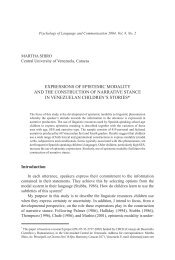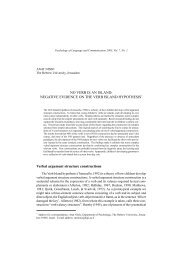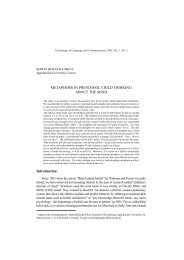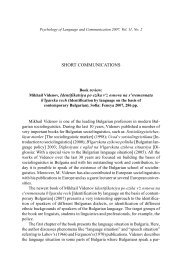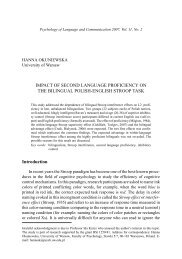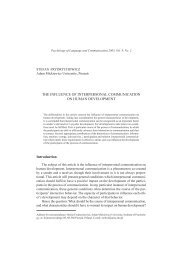The effecTs of groUP coNscioUsNess oN JAPANese lANgUAge ...
The effecTs of groUP coNscioUsNess oN JAPANese lANgUAge ...
The effecTs of groUP coNscioUsNess oN JAPANese lANgUAge ...
You also want an ePaper? Increase the reach of your titles
YUMPU automatically turns print PDFs into web optimized ePapers that Google loves.
94 Norie Mogi<br />
Table 3. In-/out-group differences<br />
Japanese (romanization) meaning in-group out-group<br />
ohayoo good ohayoo ohayoo<br />
(gozaimasu) morning (gozaimasu) gozaimasu<br />
konnichiwa good ——— konnichiwa<br />
afternoon<br />
konbanwa good evening ——— konbanwa<br />
gochisoosama thank you gochisoo gochisoosam<br />
(desu) for the meal sama a (desu)<br />
doomo thank you (doomo) (doomo)<br />
arigatoo very much arigatoo arigatoo<br />
gozaimasu<br />
gozaimasu<br />
oyasumi good night oyasumi oyasumi<br />
(nasai) (nasai) nasai<br />
tadaima i am back 25 tadaima ———<br />
okaeri welcome okaeri ———<br />
(nasai) back (nasai)<br />
home<br />
kodomo a child uchi no otaku no<br />
kodomo 26 o-ko-san 27<br />
gakusei a student kochira no sochira no<br />
gakusei 27 gakusei 29<br />
25<br />
This literally means “just now”.<br />
26<br />
Uchi means “my”, “my family”, “my home”, and “my house”. “My child”.<br />
27<br />
Otaku means “your”, “your home”, and “your house”. “Your child”.<br />
28<br />
“My/our student” or “a student in this group”.<br />
29<br />
“Your student” or “a student in that group”.



